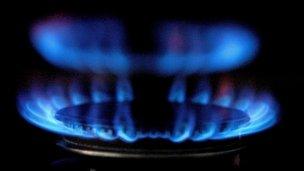Assistance needed to target fuel poverty rise - charity
- Published

About 5.5m households in the UK are already living in fuel poverty
Fuel poverty levels will continue to grow at "alarming rates" unless people are able to reduce their energy bills, a charity has warned.
National Energy Action said about 5.5m households in the UK are already living in fuel poverty, spending more than 10% of their income on energy.
It said government plans for a national programme of energy efficiency must target help at the most vulnerable.
Prime Minister David Cameron said he "welcomed" the charity's campaign.
The Warm Homes campaign, launched by National Energy Action (NEA) and Energy Action Scotland, intends to raise awareness of the escalating level of fuel poverty and promote existing means of support for people.
NEA's chief executive Jenny Saunders said it was "shocking" that millions of people were struggling to keep their homes warm and "unacceptable" that many suffered "detrimental health impacts and reductions in general wellbeing as a result of cold, damp living conditions".
She said: "Fuel poverty will continue to grow exponentially until we address its fundamentals.
"We need to address fuel poverty from the bottom up, in a systematic community wide roll out of energy efficiency. This needs to be led by local authorities and their commercial and voluntary partners,"she said.
It was "imperative" that the national programme of energy efficiency - which the government plans to introduce as part of its Energy Bill - was effective at targeting help at the most vulnerable, she added.
'Deeply worrying'
Norman Kerr, director of Energy Action Scotland said it was a "basic human right to live in a warm, dry home" but too many people were having to ration their use of domestic energy.
He said: "Those who are most vulnerable and who live in homes that are cold and too expensive to heat need assistance urgently to ensure they have an efficient heating system, a well-insulated home, can maximise their income and receive good advice on tariffs and energy use.
"We have a duty to ensure that the eradication of fuel poverty is a priority."
Mr Cameron said the government recognised both the need to help the most vulnerable as well as the "vital" role that civil society and local communities can play in helping to tackle fuel poverty.
He said: "A key part of the solution is to improve the energy efficiency of the UK's housing.
"Through the Green Deal, we will help drive investment by enabling households and businesses to take up energy efficiency improvements paid for by savings on energy bills; and we will help deliver extra support for the most vulnerable through the new Energy Company Obligation."
Labour shadow energy secretary Meg Hillier said the government was axing support for those in greatest need of warmer homes and the Green Deal was "ambitious but lacking in detail".
"It looks as if it will only reach certain households as many will be put off by the finance model the government is proposing. In the meantime those in the coldest and least efficient homes will suffer," she said.
Audrey Gallacher, head of energy policy at Consumer Focus, said it was "deeply worrying" that so many people were living in fuel poverty.
"Winter is just beginning and energy prices are going up, yet many people are still repaying debt following last year's freezing weather.
"Making our energy supply fit for the future is going to cost millions and will hit the poorest energy customers hardest.
"If thousands of hard pressed people are to avoid having to turn down the heating to make ends meet, the government must work urgently with the energy industry to deliver a strategy for making the poorest households more energy efficient," he said.
- Published16 November 2010
- Published17 November 2010
- Published12 October 2012